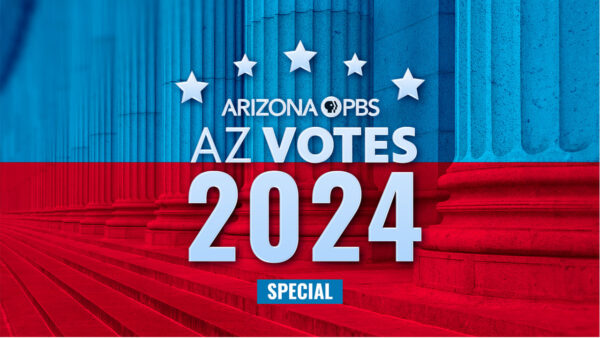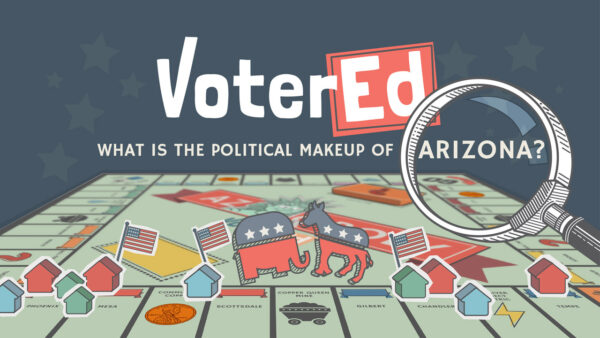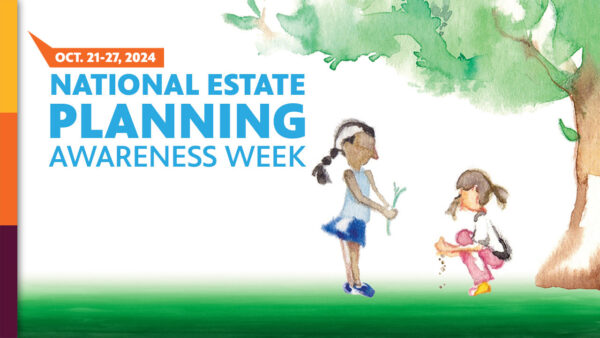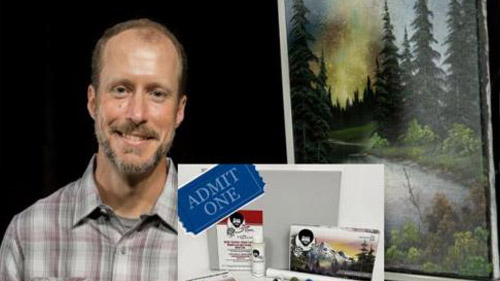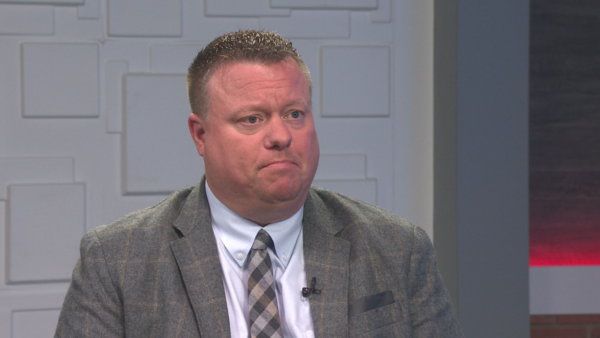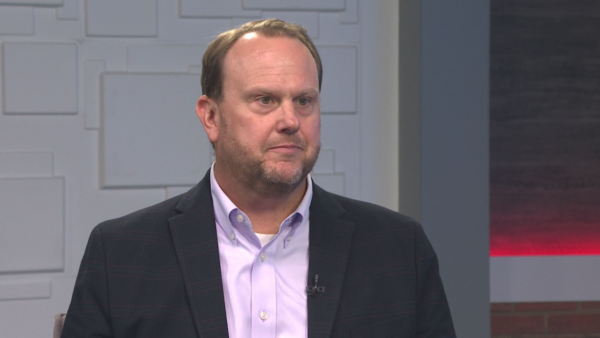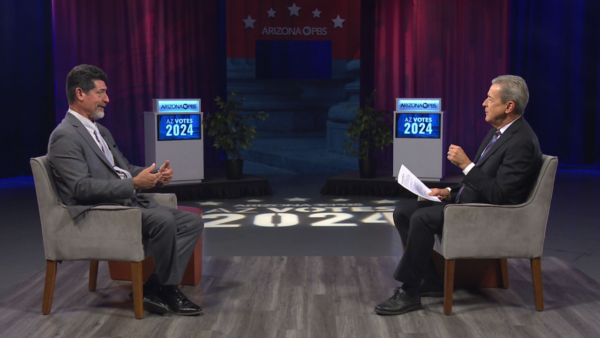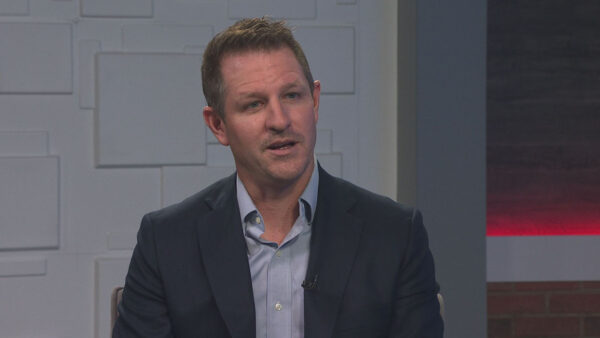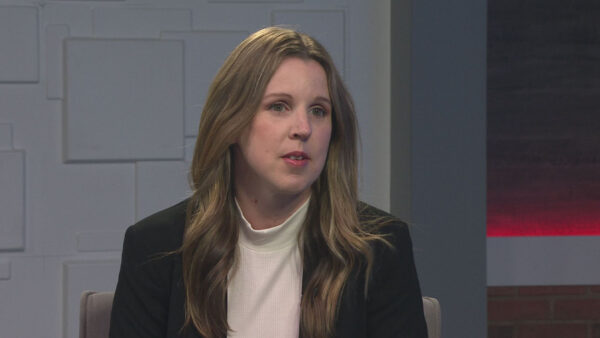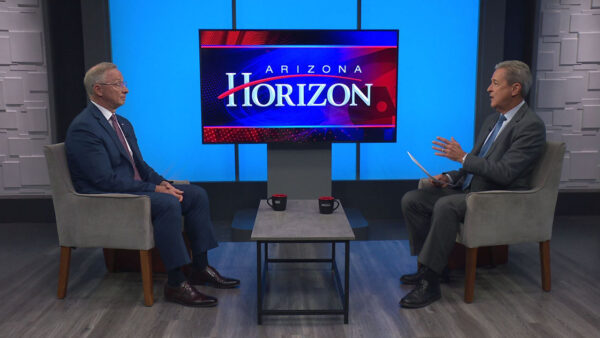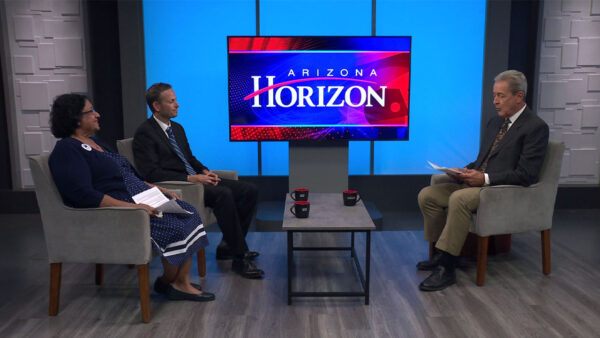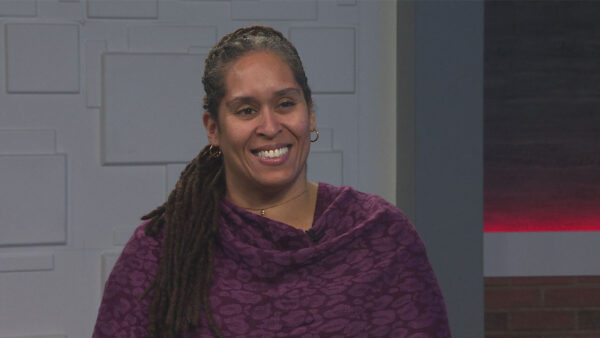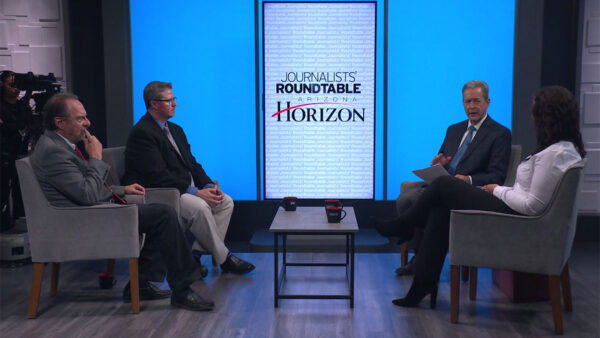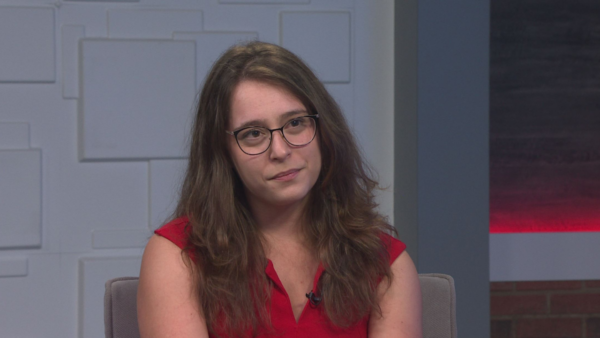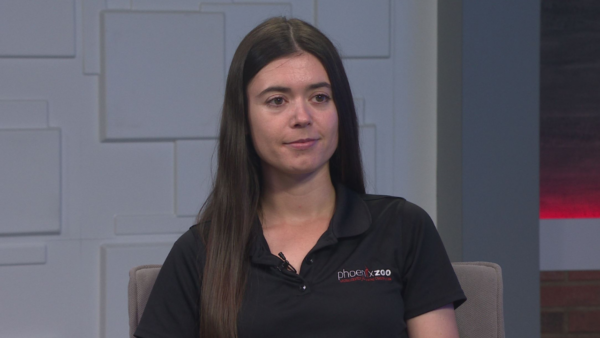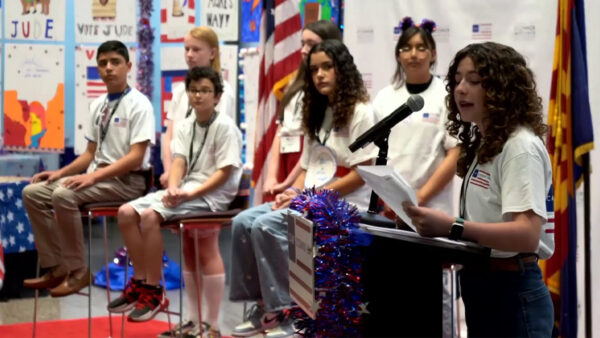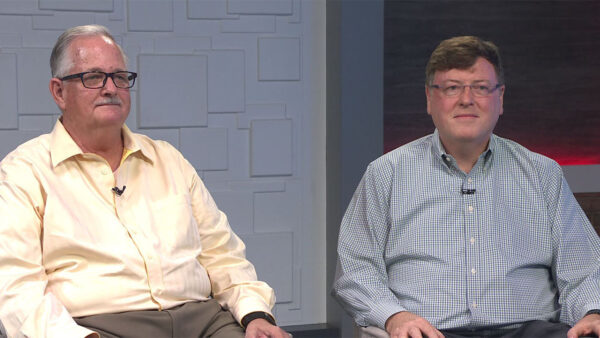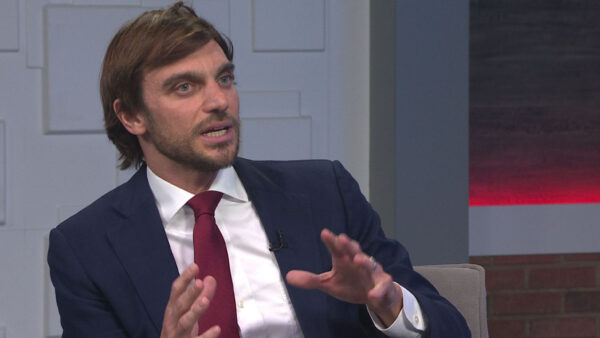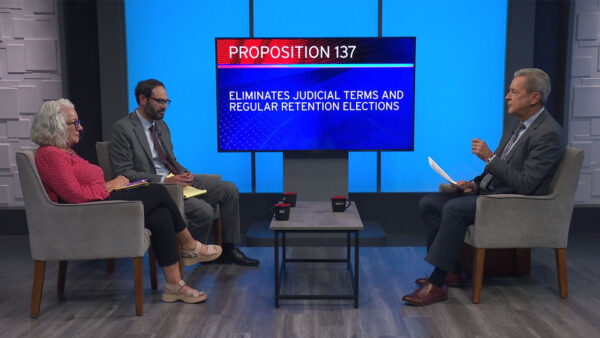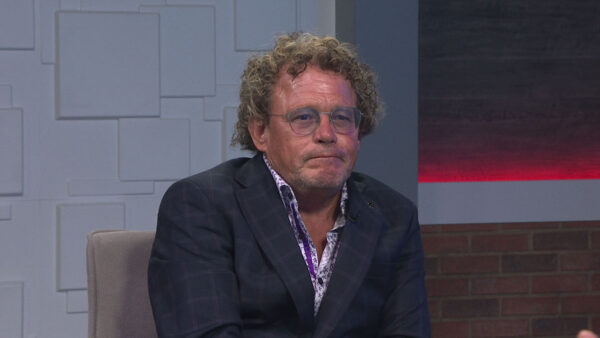Arizona’s constitution gives legislative power to the people through the process of initiative and referendum. Find out why the Arizona Supreme Court, former Governor Janet Napolitano and Governor Jan Brewer (when she was secretary of state) have recently suggested a reformation of the initiative process.
Ted Simons: Tonight we continue our series, "Legislature A to Z," with a look at reforming the ballot initiative process. But before we do that, some comments from viewers about last night's discussion with legislators on possible cuts to universities and k-12 education.
Ted Simons: Susan writes, "I'm a concerned citizen appalled at the thought of cutting any education funds instead of any option of revenue enhancement to solve our state's budget crisis. I'm hoping that when push comes to shove these elected officials will realize that they are significantly hurting our society all for the lack of any ideas to improve our revenue enhancement". And Margaret in Phoenix writes, "People often say, "The last thing you want to do is raise taxes during a recession". What if the alternative to a small, less than one cent increase in a sales tax is the loss of tens of thousands of jobs and a decline in education and/or health services? Doesn't large job losses and loss of services cause far more harm in a recession than a very minor increase in a sales tax?" So write our viewers. Our former governor, current governor, even the Arizona Supreme Court have all suggested that law makers consider reforming the process by which people place propositions on the ballot. There are a lot of different reasons for reforming the process as David Majure explains.
David Majure: State legislatures aren't the only ones allowed to pass laws. You can too. Arizona's constitution gives lawmaking power to the people through the initiative process. Gather enough valid petition signatures and your idea for a law can be placed on the ballot as a proposition for voters to decide.
Russell Pearce: Part of the problem with the initiative process is budgeting at the ballot box. I don't think our founders ever intended that.
David Majure: But it happens, when voters feel lawmakers do not adequately fund things, like education or health care, they take their concerns to the ballot. For example, in 1990, voters created the Heritage Fund to pay for conservation and wildlife protection programs with money from lottery ticket sales. In subsequent years, lawmakers have often tried to take that money for other uses. In 1997, lawmakers repealed key provisions of a medical marijuana initiative prompting supporters to go back to the ballot with prop 105. The voter protection act of 1998, it passed overwhelming. Now it takes a vote of 75% of the legislature to change any proposition approved by voters since 1998 and any changes must further the purpose of the initiative. That limits budget options for lawmakers. There are billions of dollars in voter-approved spending they simply cannot touch. Pearce wants to ask voters for the authority to access those dollars in tough economic times.
Russell Pearce: I'm pushing for it; yeah I am. That when revenues are not reach the level to pay our bills, that we have the whole budget on the table. That's all I'm asking for that we have the whole budget on the table.
Janet Napolitano: You must also consider reform of the initiative process itself.
David Majure: In her last State of the State Address, Governor Napolitano urged lawmakers to reform the process.
Janet Napolitano: I urge you to increase access to the ballot by lowering our high signature requirements but at the same time crack down on signature fraud by increasing the number of signatures to be examined. Banning payment by signature and registering paid circulators.
Helen Purcell: I think something has to be changed. I think we saw that in the last process. We had a number of issues that did not make the ballot. Part of that was the signatures. A lot of it was the signatures when you're looking at 45% bad signatures; that is not normal.
David Majure: Maricopa County recorder, Helen Purcell, says paying people by the signature contributes to the problem.
Helen Purcell: And I think that's a mistake because I think that's where we get a lot of our bad signatures.
David Majure: To qualify for the ballot, initiative petitions must be signed by 10% of the qualified electors defined as the number of people who voted for governor in the most recent general election. After checking a 5% random sample of petition signatures, if the number of signatures falls between 95% and 105% of the required minimum, every single signature must then be verified by county recorders.
Helen Purcell: We never have time to do that. Would it be better to bump up our percentage of the number of random signatures that we check and say, that's it? And maybe instead of the people turning their things in, in July, maybe we should look at January. They have from, let's say, the general election, for two years, until the next general election, should we -- maybe they only have a year to gather those signatures. I just think there's a number of things we can look at if reasonable people sit down and study it. I think we can come up with some good solutions.
Ted Simons: Joining me to talk about initiative reform is Andy Gordon, a lawyer at Coppersmith-Gordon who specializes in election law and has written several statewide initiatives; and Nick Dranias, director of constitutional policy for the Goldwater Institute, a conservative research and policy organization. Thank you both for joining us.
Nick Dranias and Andy Gordon: Thanks for having us.
Ted Simons: Nick, the initiative process, is it hopelessly broken or can it be reformed, fixed and sent back on its way?
Nick Dranias: How about both? If we're talking about the referendum process, I don't think there's anything wrong with that. The referendum process serves the original purpose of the initiative process, which is to diffuse power away from concentrations and in the legislature. On the other hand, the initiative process, aside of ballot measures that actually put laws into place and amend the constitution, there are major problems with that. I think that with the voter protection acts in place, it's radically shifted the balance of power away from the legislature toward direct democracy, which is actually contrary to the genius of our republic.
Ted Simons: Voter protection too much right now?
Andy Gordon: Well I hope that the notions of whether we need to reform the process actually don't get mixed up with notions of whether the voter protection act itself is working. There may be an argument that we should have the voters change the voter protection act to give more flexibility, particularly in budget times. But the fact that the voter protection act may need work doesn't mean that the process of passing initiatives itself needs some work. And those are two really separate questions.
Ted Simons: Let's talk about the initiative process then. Is there too much power given over to a direct vote, just direct democracy -- mob rule, some would say. Is there too much there by way of initiative?
Andy Gordon: No, when Arizona became a state, the initiative referendum recall process was built into our constitution as part of a populous movement that was concerned about special interest controlling the legislature. I think that's as big a concern now as it was when the robber barons controlled Arizona. So we need to protect that process. The Voter Protection Act, it's important to keep in mind, was passed by the voters because the legislators kept ignoring what the voters wanted to do. We need both of those at work.
Ted Simons: If you have an initiative process, how can the initiative process survive if every time something is passed by the voters, the citizenry, the legislature goes in and changes it?
Nick Dranias: I think that's an over statement. It didn't happen every time. I think that what's important is maintaining a tension in government to maintain a diffusion of power between the legislature and the people. We want the people to be concerned that if they go too far, the legislature might just repeal it. We want the legislature to be concerned that if they pass a crazy law then the people might just rise up and have it overturned by referendum. That tension is exactly what we want in our system.
Ted Simons: But did we not see voters react to that tension by saying we're tired of the tension, leave it alone?
Nick Dranias: And I think they've made a mistake because what they did by putting the Voter Protection Act in place; is they transformed what was originally an initiative process into something that almost amounts to an affective constitutional amendment process. It is so difficult for anything to be done to change an initiative that is now enacted because of the Voter Protection Act that it totally changes the balance of power in our state government.
Andy Gordon: Actually, that's not true, with all due respect. If they want to change the Voter Protection Act, all they have do is refer it back to the voters and say, do you think we ought to change it? The voters always have the power to change that. What the Voter Protection Act was protecting against was the legislature changing what the voters had done. They had done it repeatedly. Are we now finding of this particular budget crisis that the Voter Protection Act isn't a perfect piece of legislation? Yeah, I think we are. We find that in stuff that the legislature passes all the time too.
Ted Simons: Does it make sense to maybe suspend VPA for a year or two? Or maybe trigger it to where if the deficit hits a certain amount of the state budget, you go ahead and suspend Voter Protection Act.
Andy Gordon: I think there are a number of ways of trying to tinker with the Voter Protection Act to help us through the budget crisis.
Ted Simons: Do those ideas make sense to you?
Nick Dranias: Depends what the word tinker means. I think that we need something fairly strong. I'm not so sure that we even have to begin with the Voter Protection Act. How about a sun setting amendment? Something that says that any initiative law that's past will sunset after say 10 years, make it even 15 years. Something that makes it clear that when we effectively amend the Constitution through the initiative process that it's going to go away at some point in time, that this isn't a permanent transfer of power away from the legislature back to the people.
Ted Simons: You have authored initiatives in the past; first of all, can you just give us a capsule summary of what the heck happened with the time initiative.
Andy Gordon: What happened in the time initiative was… it is a very technical question. It is when was the right time to challenge the actions by the secretary of state to disqualify some signatures. The statute was very clear on when you did it, if you're challenging what the county did. What Helen Purcell's office does. But it doesn't say what to do with the secretary of state. The Arizona Supreme Court, with all due respect, I think got it completely wrong. They decided to go with the shorter time limit that was in there for the county in part because of the court's concern of the burden on the election officials and the burden on the court, without taking into consideration that the overall concern here is to follow the will of the people; that the courts have been deferential to the initiative process. So if there was an open question, rather than worry about their own work schedule, they should have worried about those people who had legitimately signed the petition. But that was a technical timing question.
Ted Simons: Does that become a de facto control on the initiative process?
Nick Dranias: I think that's the wrong kind of control. I think at this point, Andy and I are going to agree, the time line that the Constitution and current law gives folks to gather signatures to have them certified is just too short. I think a legitimate process should back that up a little bit; maybe another month or two. So we don't have the insane, you know, shoot from the hip type of legal actions that result.
Ted Simons: Some other ideas out there. The number of examined signatures, should those be increased, decreased? Should there be some set policy instead of 95 to 105, whatever that the formula is?
Nick Dranias: I happen to think we should just follow the plain language of the State Constitution. One of the concerns that I have with the statute is that it uses sampling. In reality we should back up the time frame allowed for scrutinizing the signatures. We should fund the agencies that do that adequately. And they ought to actually scrutinize signatures and not rely on a formula random sample.
Ted Simons: Can you examine signatures in an initiative process without using sampling?
Andy Gordon: Well you could but it's pointless. I mean, the fact is the random sample process works fine. We do things statistically all the time. We do need to adequately fund the offices to insure that they have enough people to do the work that the election process requires. I mean the elections; we totally agree is key and so those offices need to be funded to do the work. I think it would be silly to count every signature. I mean I don't need proof that the world is round. The world is round.
Ted Simons: We just heard the governor, with some suggestions including registering paid circulators. You like that idea?
Andy Gordon: With all due respect to the governor, the former governor, that's totally unnecessary. The circulators are already under oath as to their name, address, if they lie, there's plenty of things to prosecute them on. If they're going to lie on their signatures when they turn in the petition, they'll lie on the registration, that's not going to get you anywhere.
Nick Dranias: First thing, I totally agree with Andy on the registration of signatures. But even more fundamentally the U.S. Supreme Court has held that you cannot just impose a prior restraint on the exercise of fundamental First Amendment Rights and petitioning your government to achieve the enactment of a law or the repeal of a law is probably the essential form of petitioning your government.
Andy Gordon: Yeah I want to follow up; because we strongly agree on this. What people are overlooking, the details of the debate in light of the time, Supreme Courts; is we're talking about a fundamental right here. It is the right to go to your government to get laws passed. And this is it in its purest form.
Ted Simons: Okay how about payment by signature? What do you think of that?
Andy Gordon: You know, I think the notion -- someone said, you know, these cases are never prosecuted for fraud. Well that may be because there isn't much fraud. I don't know that it would make a heck of a lot of difference to do it one way or the other. I'm very worried about the law of unintended consequences which seems to be particularly prevalent in this area. There's, if they're violating the law there's a lot of basis for prosecuting now, I'm just not sure that's necessary.
Ted Simons: Tell a guy that I'll give you so much money for so many signatures, and you get paid by the signature; is that a good idea?
Nick Dranias: I think it's an idea that the Constitution prevents us from regulating. You have someone earning a living, exercising yours and his First Amendment Right to petition the government. I can't think of an example of something that deserves more first amendment protection than that; it's a matter of principle. Now just getting back to the random sample thing; I think that Andy's right. We don't want to have to count every single signature. Maybe I made an over statement in that. What we want to do is make sure the sample we get actually is 100% consistent with what the finding has to be under the constitution. There shouldn't be a range of 95% to 105%. If you draw a random sample, then within that random sample, you should actually demonstrate that you're approaching much closer to 100% valid signatures than what the law currently provides.
Ted Simons: Regarding naming of initiatives which kind of got some attention here this last go around; reform due there?
Nick Dranias: I don't think there's anything you can do about it. If you respect the Constitution, if you believe in free expression, free speech and giving voice to the person who is actually putting the petition before the voters, the government really can't go in there and censor how that is framed. I just don't think you should touch it.
Andy Gordon: Well, I agree with that. It's got the highest level of first amendment -- and no one is talking about having the legislature change their process and they name acts all the time. They like catchy little phrases. So if they have to go out to the voters to drum up support.
Ted Simons: Last question because we have about 30 seconds here. We're talking -- we've got a lot of ideas on the table here. Reforming the initiative process; everyone wants to do it. Can it be done?
Andy Gordon: Well, I wouldn't -- let me put it this way. The Cardinals have a much better chance this weekend.
Ted Simons: Wow!
Nick Dranias: Simple, repeal through a Constitutional Amendment, the Voter Protection Act. If you can't do that then add an amendment that sunsets initiative laws, 10 years, 15 years, some reasonable duration so we know that the shift of power away from the legislature isn't permanent.
Ted Simons: All right, we'll stop it right there. Gentlemen, thank you very much for joining us.
Andy Gordon: Thank you; it was fun.
Nick Dranias: Thank you
